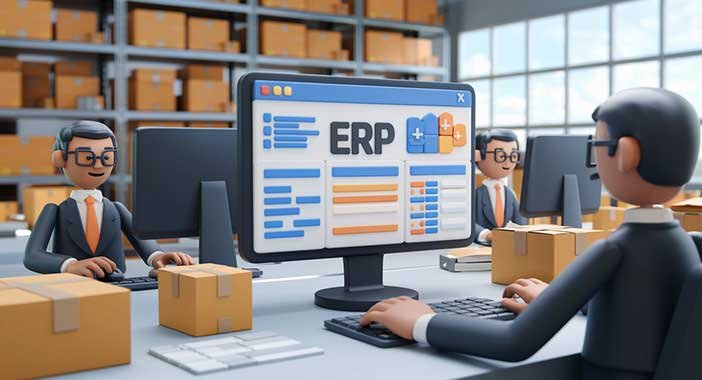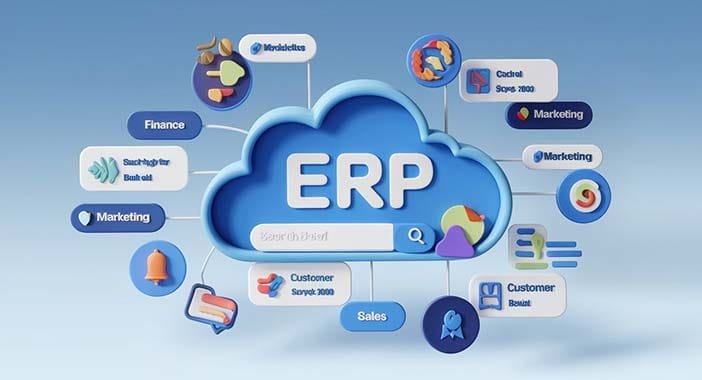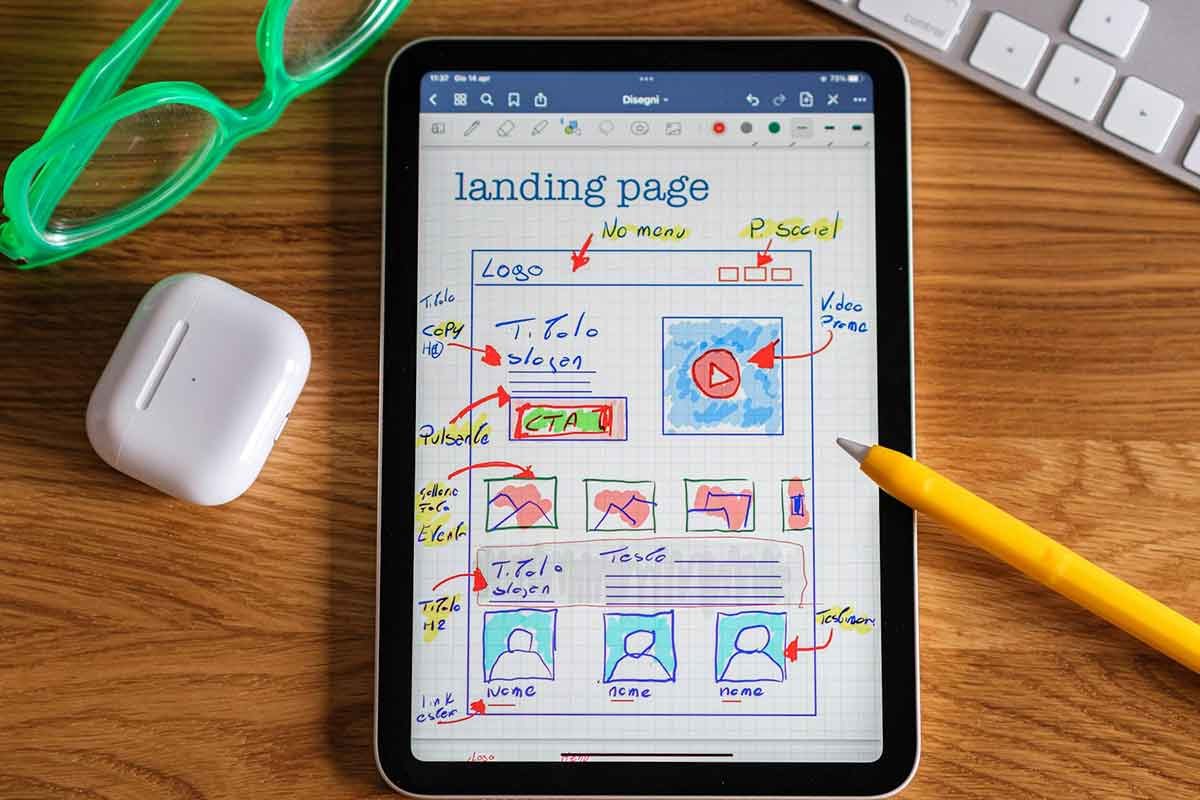Top Benefits of ERP Systems for B2B Growth in 2024
- Introduction: Top Benefits of ERP Systems for B2B Growth in 2024
- What is an ERP System?
- Key Benefits of ERP Systems for B2B Growth:
- Enhanced Operational Efficiency
- Automated Workflows
- Improved Collaboration
- Streamlined Processes
- Data-Driven Decision Making
- Real-Time Insights
- Advanced Analytics
- Improved Forecasting
- Enhanced Customer Relationship Management (CRM)
- Improved Customer Service
- Increased Customer Retention
- Better Sales Management
- Scalability and Flexibility
- Adaptable to Growth
- Modular Design
- Cloud-Based Solutions
- Cost Reduction and Increased ROI
- Reduced Operational Costs
- Improved Inventory Management
- Increased Productivity
- Improved Supply Chain Management
- End-to-End Visibility
- Enhanced Collaboration with Suppliers
- Optimized Logistics
- Enhanced Security and Compliance
- Data Security
- Compliance with Regulations
- Audit Trails
- Enhanced Operational Efficiency
- Choosing the Right ERP System for Your B2B Business:
- Business Needs
- Industry-Specific Features
- Scalability and Flexibility
- Deployment Options
- Budget and Implementation Costs
- Conclusion
Q&A:
Frequently Asked Questions about ERP Systems for B2B Growth
What is the difference between cloud-based ERP and on-premise ERP?
How long does it typically take to implement an ERP system?
What are some common challenges in ERP implementation?
How can I ensure a successful ERP implementation?
How much does an ERP system cost?
Sources:
FAQ
- What is SEO Audit?
- What are the best hosting providers?
- How to boost sales with effective marketing?
- Rank # 1 on Google With Rank Math SEO Content AI
- What is Marketing Analytics and Business Intelligence?
- What are some powerful strategies to drive online growth?
Top Benefits of ERP Systems for B2B Growth in 2024

The B2B landscape of 2024 is more demanding than ever. Businesses face increasing pressure to optimize operations, personalize customer experiences, and make data-driven decisions in real-time. In this highly competitive environment, achieving sustainable growth requires a strategic approach to technology adoption, and Enterprise Resource Planning (ERP) systems have emerged as a cornerstone of successful B2B strategies. These powerful software solutions offer a comprehensive suite of integrated tools designed to streamline processes, enhance collaboration, and unlock valuable insights across all departments. This article delves into the top benefits of ERP systems and how they can empower B2B organizations to not only survive but thrive in the modern market.
Gone are the days of siloed information and disjointed processes. Today’s B2B landscape demands agility, efficiency, and a 360-degree view of the business. ERP systems provide precisely that, integrating core business functions such as finance, accounting, human resources, supply chain management, customer relationship management (CRM), and inventory management into a single, unified platform. This interconnectedness eliminates data redundancy, improves data accuracy, and provides a holistic view of the organization, enabling better decision-making at all levels.
Beyond simple process automation, ERP systems offer a strategic advantage by providing real-time access to critical business data. This empowers B2B organizations to leverage data-driven insights for improved forecasting, optimized resource allocation, and enhanced customer relationship management. By breaking down departmental barriers and fostering seamless communication, ERP systems create a more collaborative and efficient work environment, enabling businesses to respond quickly to market changes and capitalize on emerging opportunities. In the following sections, we’ll explore the specific benefits of ERP systems and how they can be leveraged to drive B2B growth in 2024 and beyond.
What is an ERP System?

In today’s interconnected business world, managing various departments and processes efficiently can be a significant challenge. Enterprise Resource Planning (ERP) systems offer a powerful solution by providing a comprehensive software platform that integrates a wide range of business functions into a single, unified system. Think of it as the central nervous system of your organization, connecting all the vital parts and enabling them to work together seamlessly.
At its core, an ERP system acts as a central hub for all your business data, encompassing everything from finance and accounting to human resources, supply chain management, customer relationship management (CRM), inventory management, and more. Instead of relying on disparate systems and spreadsheets, an ERP system brings all this information together, eliminating data silos and providing a single source of truth. This centralized approach not only streamlines data management but also improves data accuracy and consistency, laying the foundation for better decision-making across the organization.
The benefits of this integrated approach are multifaceted. By connecting different departments and functions, ERP systems facilitate improved collaboration and communication. Real-time data visibility empowers teams to work together more effectively, breaking down traditional silos and fostering a more cohesive and agile organization. Moreover, the automation capabilities of ERP systems streamline workflows, reducing manual data entry, minimizing errors, and freeing up valuable time and resources.
From automating invoice processing and purchase orders to managing inventory levels and tracking customer interactions, ERP systems empower businesses to optimize their operations and achieve greater efficiency. In essence, an ERP system provides a holistic view of the business, enabling better decision-making, improved collaboration, and increased efficiency, ultimately driving growth and success in today’s competitive market.
Key Benefits of ERP Systems for B2B Growth:
1. Enhanced Operational Efficiency: Streamlining Your Business for Optimal Performance
One of the most significant benefits of ERP systems is their ability to dramatically enhance operational efficiency. This is achieved through several key mechanisms, including automation, streamlined processes, and improved collaboration.

- Automated Workflows: ERP systems automate repetitive, manual tasks, freeing up valuable time and resources. This automation reduces the risk of human error, leading to greater accuracy and improved overall efficiency. Employees can focus on higher-value activities, driving productivity and innovation.
- Streamlined Processes: By integrating different departments and functions, ERP systems streamline workflows and eliminate redundancies. Bottlenecks are identified and addressed, leading to smoother operations and faster processing times. This improved efficiency translates to cost savings and faster time to market.
- Improved Collaboration: A centralized ERP platform fosters better communication and collaboration between departments. Information flows seamlessly across the organization, enabling teams to work together more effectively. This enhanced collaboration leads to improved productivity and better decision-making. By automating tasks, streamlining processes, and fostering collaboration, ERP systems empower businesses to optimize their operations and achieve peak performance. This enhanced efficiency frees up resources, reduces costs, and allows businesses to focus on strategic initiatives that drive growth and innovation.
2. Data-Driven Decision Making: Fueling Growth with Actionable Insights
In today’s data-rich environment, the ability to extract meaningful insights from vast amounts of information is no longer a competitive advantage—it’s a necessity. Enterprise Resource Planning (ERP) systems empower businesses to harness the power of data by providing real-time visibility, advanced analytics, and improved forecasting capabilities, enabling data-driven decision-making at every level of the organization.

- Real-Time Insights: Making Informed Decisions in the Moment
Traditional reporting methods often rely on outdated information, hindering the ability to respond quickly to changing market conditions. ERP systems provide real-time access to critical business data, giving decision-makers up-to-the-minute insights into key performance indicators (KPIs) such as sales figures, inventory levels, production output, and customer behavior.
This real-time visibility empowers businesses to identify trends, spot potential problems, and make informed decisions in the moment, enabling greater agility and responsiveness. Imagine being able to adjust production schedules based on real-time inventory levels, proactively address customer service issues before they escalate, or optimize pricing strategies based on current market demand. These are just a few examples of how real-time insights from an ERP system can transform decision-making and drive better business outcomes.
- Advanced Analytics: Uncovering Hidden Opportunities and Driving Strategic Growth
Beyond real-time data access, modern ERP systems offer robust reporting and analytics tools that provide deeper insights into business performance. These tools go beyond basic reporting, enabling businesses to analyze historical data, identify trends, and uncover hidden opportunities for improvement. By leveraging advanced analytics, businesses can gain a deeper understanding of customer behavior, optimize sales and marketing campaigns, improve supply chain efficiency, and identify areas for cost reduction. The ability to visualize data through interactive dashboards and reports empowers decision-makers to quickly grasp complex information and make data-driven decisions that drive strategic growth.
- Improved Forecasting: Planning for the Future with Confidence
Accurate forecasting is essential for effective resource allocation and long-term planning. ERP systems provide the data accuracy and analytical capabilities needed to generate more reliable forecasts. By analyzing historical data, current trends, and market conditions, businesses can better predict future demand, optimize inventory levels, and plan production schedules more effectively. This improved forecasting accuracy minimizes stockouts, reduces waste, and improves overall operational efficiency, enabling businesses to plan for the future with confidence.
In conclusion, data-driven decision-making is no longer a luxury but a requirement for success in today’s competitive landscape. ERP systems provide the tools and insights necessary to empower businesses to make informed decisions, optimize operations, and drive sustainable growth. By leveraging real-time insights, advanced analytics, and improved forecasting capabilities, businesses can gain a competitive edge and achieve their strategic objectives.
3. Enhanced Customer Relationship Management (CRM): Building Stronger Customer Relationships
In today’s competitive market, providing exceptional customer experiences is paramount to success. ERP systems with integrated CRM functionality empower businesses to strengthen customer relationships, improve service, and drive sales growth.

- Improved Customer Service: Integrated CRM provides a 360-degree view of each customer, including their purchase history, interactions, and preferences. This comprehensive view enables personalized and efficient customer service, leading to greater customer satisfaction.
- Increased Customer Retention: By providing personalized experiences and resolving issues quickly, businesses can foster customer loyalty and improve retention rates. Happy customers are more likely to become repeat customers, driving long-term revenue growth.
- Better Sales Management: ERP systems streamline sales processes by automating tasks, tracking leads, and managing customer interactions. This improved efficiency empowers sales teams to close deals faster and achieve higher sales targets. By enhancing customer service, boosting retention, and improving sales management, ERP systems contribute significantly to overall business growth and profitability. These systems enable businesses to build stronger customer relationships, which are essential for long-term success in today’s competitive landscape.
4. Scalability and Flexibility: Adapting to Change and Future-Proofing Your Business
In today’s dynamic business environment, adaptability is key to survival and growth. ERP systems offer the scalability and flexibility needed to navigate change and future-proof your operations.

- Adaptable to Growth: ERP systems are designed to scale seamlessly with your business. Whether you’re expanding into new markets, adding new product lines, or experiencing rapid growth in customer base, your ERP system can adapt to accommodate your evolving needs.
- Modular Design: The modular architecture of ERP systems allows businesses to choose and implement only the specific modules they need. This provides flexibility and customization, allowing you to tailor the system to your unique requirements and avoid unnecessary costs.
- Cloud-Based Solutions: Cloud-based ERP systems offer even greater flexibility, scalability, and accessibility. They eliminate the need for expensive on-premise infrastructure and provide access to the latest features and updates automatically. By offering adaptability, modularity, and cloud-based options, ERP systems ensure that your technology investments can support your business growth and evolution for years to come. This flexibility allows you to respond quickly to market changes and seize new opportunities as they arise.
5. Cost Reduction and Increased ROI: Maximizing Your Technology Investment

Implementing an ERP system can lead to significant cost savings and a strong return on investment (ROI). These benefits are realized through reduced operational costs, improved inventory management, and increased productivity.
- Reduced Operational Costs: Automation of manual tasks, streamlined processes, and improved efficiency translate directly to reduced operational costs. By minimizing errors, reducing waste, and optimizing resource allocation, businesses can free up capital for other strategic initiatives.
- Improved Inventory Management: Real-time inventory tracking and management capabilities minimize stockouts and prevent overstocking. This optimization of inventory levels reduces carrying costs and ensures that businesses have the right products available at the right time.
- Increased Productivity: Automated workflows and improved collaboration boost employee productivity. By streamlining tasks and facilitating communication, ERP systems empower employees to work more efficiently, maximizing output and resource utilization. By reducing costs, optimizing inventory, and boosting productivity, ERP systems contribute to a healthier bottom line and a stronger ROI. These financial benefits make ERP a smart investment for businesses looking to improve their profitability and long-term financial health.
6. Improved Supply Chain Management: Optimizing Your Supply Chain for Competitive Advantage

In today’s globalized marketplace, efficient supply chain management is crucial for success. ERP systems provide the tools and visibility needed to optimize every stage of the supply chain, from procurement to delivery.
- End-to-End Visibility: ERP systems offer complete transparency into the supply chain, providing real-time insights into inventory levels, order status, and shipment tracking. This end-to-end visibility enables proactive management of potential disruptions and ensures timely delivery of goods and services.
- Enhanced Collaboration with Suppliers: Improved communication and collaboration with suppliers are essential for a smooth and efficient supply chain. ERP systems facilitate seamless information sharing with suppliers, streamlining procurement processes and optimizing inventory levels.
- Optimized Logistics: Real-time tracking and management of shipments enable businesses to optimize logistics and reduce delivery times. By identifying potential delays and streamlining transportation routes, ERP systems contribute to faster and more cost-effective delivery of goods. By providing end-to-end visibility, enhancing supplier collaboration, and optimizing logistics, ERP systems empower businesses to build more resilient and responsive supply chains. This improved efficiency translates to cost savings, faster delivery times, and increased customer satisfaction.
7. Enhanced Security and Compliance: Protecting Your Data and Ensuring Regulatory Compliance
Data security and regulatory compliance are paramount concerns for businesses of all sizes. ERP systems offer robust features that help protect sensitive information and ensure adherence to industry regulations.

- Data Security: Centralized data management within an ERP system strengthens security by providing a single point of control. Robust security features, such as access controls and encryption, protect sensitive business information from unauthorized access and cyber threats.
- Compliance with Regulations: ERP systems help businesses comply with industry-specific regulations and data privacy requirements, such as GDPR, HIPAA, and SOX. Built-in compliance features streamline reporting and ensure adherence to legal obligations.
- Audit Trails: Detailed audit trails within the ERP system provide transparency and accountability. These trails track every transaction and modification, facilitating compliance audits and investigations. By enhancing data security, streamlining compliance processes, and providing comprehensive audit trails, ERP systems mitigate risks and build trust with customers and partners. This focus on security and compliance protects your business and strengthens its reputation in the marketplace.
8. Choosing the Right ERP System for Your B2B Business:
Selecting the right ERP system is a critical decision that can significantly impact your business’s success. It’s not a one-size-fits-all solution, and the best choice depends on a variety of factors specific to your organization. Taking the time to carefully evaluate your needs and research different options will ensure you select a system that aligns with your goals and supports your growth trajectory.

- Business Needs: Before evaluating specific ERP systems, it’s essential to thoroughly assess your current business processes and identify areas where an ERP system can provide the most value. What are your biggest pain points? Are you struggling with inefficient workflows, data silos, or lack of visibility into key metrics? Define your specific requirements and prioritize the functionalities that are most critical to your operations. This will help you narrow down your options and focus on systems that address your unique needs.
- Industry-Specific Features: Different industries have unique requirements and regulatory considerations. Look for ERP systems that offer industry-specific features and functionalities that cater to your particular sector. For example, a manufacturing company will have different needs than a retail business or a healthcare provider. Specialized features can streamline industry-specific processes, improve compliance, and provide tailored insights that are relevant to your business.
- Scalability and Flexibility: Choosing an ERP system that can scale with your business is crucial for long-term success. As your business grows and evolves, your ERP system should be able to adapt to changing needs and accommodate increased data volumes, user traffic, and transactional complexity. Consider factors like modularity, customization options, and integration capabilities to ensure the system can grow alongside your business.
- Deployment Options: ERP systems can be deployed in various ways, including cloud-based, on-premise, and hybrid models. Cloud-based solutions offer greater flexibility, accessibility, and lower upfront costs, while on-premise deployments provide more control and customization options. Hybrid models combine the benefits of both approaches. Evaluate the pros and cons of each deployment option and choose the one that best aligns with your IT infrastructure, budget, and security requirements.
- Budget and Implementation Costs: Implementing an ERP system involves significant investment, and it’s crucial to consider the total cost of ownership (TCO). This includes not only the initial software license fees but also implementation costs, ongoing maintenance, support, training, and potential customization expenses. Develop a realistic budget and carefully evaluate the pricing models of different vendors to ensure the system fits within your financial constraints. Request detailed quotes and compare the TCO of different options before making a final decision. Choosing the right ERP system requires careful planning and consideration. By thoroughly evaluating your business needs, exploring industry-specific features, considering scalability and deployment options, and understanding the total cost of ownership, you can make an informed decision that will set your business up for success.
Conclusion
Implementing an ERP system represents a significant investment for any B2B business. However, in the dynamic landscape of 2024 and beyond, it’s no longer a luxury but a strategic necessity for companies aiming to thrive. The benefits extend far beyond simple process automation, impacting every facet of the organization. By unifying disparate systems and data silos, an ERP system provides a single source of truth, empowering businesses with the real-time insights needed to make informed decisions and respond agilely to market changes. This translates to enhanced operational efficiency through automated workflows and streamlined processes, freeing up valuable time and resources that can be redirected towards innovation and growth initiatives.
Furthermore, the improved collaboration fostered by a centralized platform breaks down departmental barriers, leading to a more cohesive and productive workforce. The enhanced visibility into customer interactions, sales pipelines, and supply chain operations empowers businesses to build stronger relationships, optimize sales strategies, and improve customer satisfaction, ultimately leading to increased customer retention and loyalty.
In a marketplace increasingly driven by data, the advanced analytics and reporting capabilities of modern ERP systems provide the tools necessary to understand key performance indicators, identify trends, and make data-driven decisions that propel business growth. The ability to accurately forecast demand, optimize inventory levels, and streamline supply chain operations translates directly to cost reductions and increased profitability.
Beyond the immediate operational benefits, a well-implemented ERP system provides the foundation for long-term scalability and adaptability. As your business grows and evolves, the modular design and flexible architecture of ERP systems allow you to adapt to changing needs and integrate new functionalities seamlessly. Whether it’s expanding into new markets, launching new product lines, or adapting to evolving industry regulations, an ERP system provides the agility and resilience needed to navigate the complexities of the modern business environment.
In conclusion, while the decision to implement an ERP system requires careful consideration and planning, the potential rewards are substantial. By embracing the power of integrated systems and data-driven insights, B2B businesses can unlock new levels of efficiency, productivity, and profitability, positioning themselves for sustainable growth and success in the years to come. Don’t just react to the market—anticipate and shape it with the strategic advantage provided by a robust ERP solution.
Q&A: Frequently Asked Questions about ERP Systems for B2B Growth
Here are some common questions about ERP systems and their role in B2B growth:
Q1: What is the difference between cloud-based ERP and on-premise ERP?
A: Cloud-based ERP systems are hosted on the vendor’s servers and accessed via the internet, while on-premise ERP systems are installed and maintained on the company’s own servers. Cloud-based ERP offers greater flexibility, scalability, and lower upfront costs, while on-premise ERP provides more control over data and customization options.
Q2: How long does it typically take to implement an ERP system?
A: The implementation timeline for an ERP system varies depending on the complexity of the system, the size of the business, and the scope of the implementation. It can range from a few months to over a year. Proper planning, resource allocation, and change management are crucial for a successful implementation.
Q3: What are some common challenges in ERP implementation?
A: Some common challenges include data migration issues, resistance to change from employees, integration with existing systems, and managing the project within budget and timeline. Addressing these challenges proactively through thorough planning, communication, and training is essential.
Q4: How can I ensure a successful ERP implementation?
A: Key factors for successful ERP implementation include:
- Clearly defined goals and objectives: Establish specific, measurable, achievable, relevant, and time-bound (SMART) goals for the ERP implementation.
- Thorough planning and preparation: Develop a detailed implementation plan that includes timelines, resource allocation, and risk mitigation strategies.
- Change management: Communicate effectively with employees throughout the implementation process and provide adequate training to ensure smooth adoption.
- Executive sponsorship: Secure buy-in and support from senior management to ensure the project has the necessary resources and authority.
- Vendor selection: Choose a reputable ERP vendor with a proven track record and experience in your industry.
Q5: How much does an ERP system cost?
A: The cost of an ERP system varies widely depending on factors such as the vendor, the number of users, the modules selected, and the deployment method (cloud-based vs. on-premise). It’s essential to obtain quotes from multiple vendors and carefully evaluate the total cost of ownership, including implementation, customization, and ongoing maintenance.
Sources:
- Oracle NetSuite: www.netsuite.com
- SAP: www.sap.com
- Microsoft Dynamics 365: dynamics.microsoft.com
- Infor: www.infor.com
- Epicor: www.epicor.com







6 replies on “Top Benefits of ERP Systems for B2B Growth in 2024”
As someone working in B2B sales, I can attest to the importance of CRM integration within an ERP system. This article perfectly highlights how a unified platform can streamline sales processes and improve customer relationships. Thanks for sharing these insights!
Really appreciate the practical advice in this post, especially the section on choosing the right ERP system. The emphasis on considering business needs, industry-specific features, and scalability is spot on. This is a must-read for any business leader considering ERP implementation.
This is a fantastic overview of ERP benefits. We’ve been considering implementing a system for a while, and this article really solidified the advantages, especially the sections on data-driven decision-making and improved supply chain management. Thanks for laying it out so clearly!
Great read! The explanation of the different types of ERP systems (cloud-based vs. on-premise) was particularly helpful. We’re a small B2B startup, and understanding the deployment options is key for us. Definitely bookmarking this for future reference.
The Q&A section at the end was super helpful! It addressed a lot of the questions I had about implementation timelines and potential challenges. This article is a valuable resource for anyone navigating the ERP landscape.
This article does a great job of explaining the complexities of ERP in a clear and concise way. I especially liked the focus on the long-term benefits, such as scalability and adaptability. It’s clear that ERP is an investment in future growth